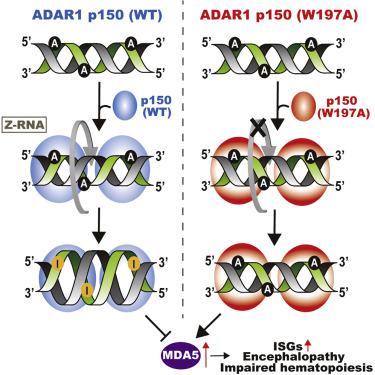Immunity ( IF 32.4 ) Pub Date : 2021-09-14 , DOI: 10.1016/j.immuni.2021.08.022 Taisuke Nakahama 1 , Yuki Kato 2 , Toshiharu Shibuya 1 , Maal Inoue 1 , Jung In Kim 1 , Tuangtong Vongpipatana 1 , Hiroyuki Todo 1 , Yanfang Xing 1 , Yukio Kawahara 3

|
Mutations in the adenosine-to-inosine RNA-editing enzyme ADAR1 p150, including point mutations in the Z-RNA recognition domain Zα, are associated with Aicardi-Goutières syndrome (AGS). Here, we examined the in vivo relevance of ADAR1 binding of Z-RNA. Mutation of W197 in Zα, which abolished Z-RNA binding, reduced RNA editing. Adar1W197A/W197A mice displayed severe growth retardation after birth, broad expression of interferon-stimulated genes (ISGs), and abnormal development of multiple organs. Notably, malformation of the brain was accompanied by white matter vacuolation and gliosis, reminiscent of AGS-associated encephalopathy. Concurrent deletion of the double-stranded RNA sensor MDA5 ameliorated these abnormalities. ADAR1 (W197A) expression increased in a feedback manner downstream of type I interferons, resulting in increased RNA editing at a subset of, but not all, ADAR1 target sites. This increased expression did not ameliorate inflammation in Adar1W197A/W197A mice. Thus, editing of select endogenous RNAs by ADAR1 is essential for preventing inappropriate MDA5-mediated inflammation, with relevance to the pathogenesis of AGS.
中文翻译:

阻止内源性 Z-RNA 结合的腺苷脱氨酶 ADAR1 的突变诱导 Aicardi-Goutières 综合征样脑病
腺苷转肌苷 RNA 编辑酶 ADAR1 p150 的突变,包括 Z-RNA 识别域 Zα 中的点突变,与 Aicardi-Goutières 综合征 (AGS) 相关。在这里,我们检查了ADAR1 与 Z-RNA 结合的体内相关性。Zα 中 W197 的突变消除了 Z-RNA 结合,减少了 RNA 编辑。Adar1 W197A/W197A小鼠出生后表现出严重的生长迟缓、干扰素刺激基因 (ISG) 的广泛表达和多器官发育异常。值得注意的是,大脑畸形伴有白质空泡化和神经胶质增生,让人联想到 AGS 相关脑病。双链RNA传感器MDA5的同时缺失改善了这些异常。ADAR1 (W197A) 表达在 I 型干扰素下游以反馈方式增加,导致 ADAR1 靶点子集(但不是全部)的 RNA 编辑增加。这种增加的表达并没有改善Adar1 W197A/W197A小鼠的炎症。因此,通过 ADAR1 编辑选择的内源性 RNA 对于预防不适当的 MDA5 介导的炎症至关重要,这与 AGS 的发病机制有关。


























 京公网安备 11010802027423号
京公网安备 11010802027423号